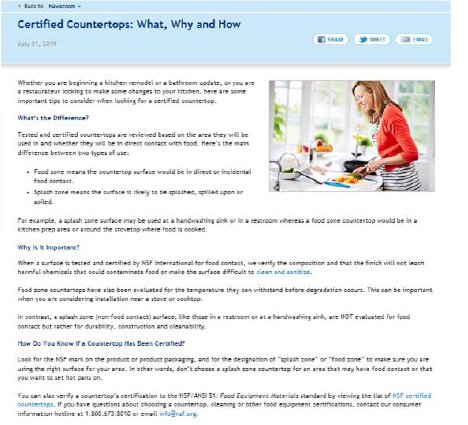Americans warn that resins in untested quartz could be unsafe to use with food
While concern has been rising across the western world about the danger of silica dust when making quartz worktops, Americans have now added the spectacle of food contamination by the resins used in some of the products used as kitchen worktops. It has started to concern end users in the UK, too, including MumsNet.
Concerns have been raised In America by NSF, which orginally stood for National Sanitation Foundation when it started in 1944. These days it is called NSF International and aims to protect public health. One of the ways it does that is by certifying products as fit for purpose. Most (if not all) the branded Western quartz producers have had their worktop materials certified as being food safe to NSF/ANSI 51. You can see the extensive list of products certified by the NSF here.
But many stone fabricators are now importing quartz directly from China because it is cheaper. And much of it has not been tested.
In America, tariffs of as much as 500% have been put on quartz from China because America says it is being 'dumped' on their market. The Chinese have concentrated on other markets, including Europe. Chinese quartz is less expensive than quartz produced in America or Europe but few people are checking on its composition. It is the resin used to make quartz that is concerning NSF.
Although the manufacturers say engineered quartz contains more than 90% quartz, that is by weight. By volume the resin that sticks the quartz together is generally 30% or more of the finished slab. The resins used often come from the petrochemical industry and conceivably could contain constituents, including carcenogens, that you do not want to come into contact with food.
When a surface is tested and certified by NSF International for being safe in food contact areas, the composition is verified not to leach harmful chemicals that could contaminate food or make the surface difficult to clean and sanitize.
Food zone countertops have also been evaluated for the temperature they can withstand before degradation occurs. This can be important when you are considering installation near a stove or hob.
How do you know If a countertop has been certified? Look for the NSF Mark on the product or product packaging and for the designation of 'food zone' to make sure you are using a worktop that has been verified as food safe. You can check to make sure a worktop is verified on the link above.
This is not a brand specific warning. Most Western manufacturers of quartz and ceramics have NSF/ANSI 51 certification. But many consumers (and some design professionals) are unaware of the possibility of the risks that have been flagged up by NSF of chosing or specifying low cost own brand quartz.

